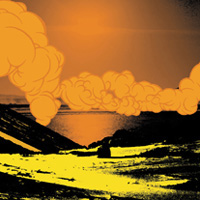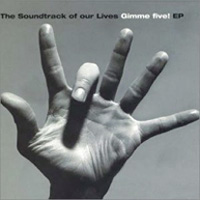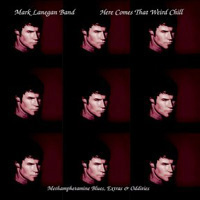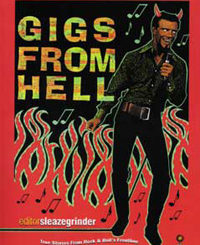 Pelican
Pelican
Australasia (Hydra Head)
An interview with guitarist Trevor de Brauw
By Brian Varney
I’ve seen Pelican live but don’t know who’s who. I know you’re one of the guitarists: Are you the Les Paul or the SG?
My name’s Trevor, I play the SG.
I have the CD by your grindcore band, Tusk. It’s interesting to me that three members of Pelican are in Tusk, but the two bands couldn’t sound any more different. What’s the common currency among the two bands that allows you to exist in such different environments?
There’s a couple of ways to answer that. The simplest thing to say would be that both bands answer to our love for extreme sound. We all love really far-out forms of music, and the two bands are independent manifestations of our appreciation of this aesthetic. Tusk is an attempt to harness chaos into aural antagonism; Pelican is sort of an opposite, taking an antagonistic form and trying to unmask the beauty that hides within the framework. The real truth of the matter, though, is that the common currency that binds the bands together is simple love of music. A lot of folks can’t believe that the same people are responsible for the two bands, but the tastes of the personnel between the two bands are so diverse that we’d be shortchanging ourselves by not having multiple outlets for all of the ideas running around in our skulls.
Which band came first? Was Pelican a side project? Something else?
Tusk has been kicking around for five years now, maybe six. Pelican has been around almost three years. Though Tusk was never really well-liked, we decided to put out a discography CD early into our career that would feature bonus solo recordings and side projects from everyone in the band (like many ideas, the CD never came to fruition). Larry and Laurent got together and recorded the song “Mammoth” on a jukebox as a contribution. After that, Laurent just kept writing more riffs, and they added Bryan and me to the mix. I guess it was intended as a side project for a minute, but it became a full-fledged band pretty quickly.
When Pelican started, did the band have any sorts of goals or artistic destinations in mind?
Yes, but they were not the same artistic goals we have now. At first, we wanted to be loud, heavy, and slow. Those things don’t matter much to me now. Somewhere down the road, we became more self-aware. A sound developed on its own, and we began to learn about it and how to control it. For instance, not having a singer wasn’t an aesthetic choice to begin with; we just didn’t have anyone who could sing. But when we reached a point where it became obvious that we were an instrumental band, we began crafting the songs with arrangements that were full-on their own, while trying leave space for the listener to have a personal interaction with the music.
The one-sheet that came with Australasia indicates that the EP was recorded for $300. Does one of you work at a studio or something? That’s an awfully nice-sounding $300 recording.
The EP, like Australasia, was recorded with our friend Sanford Parker. At the time we did the EP, he was working for a record label called Seraph. The label also doubled as a law office, and tripled as an audio and video production center. While Sanford was working there, they built an in-house ProTools recording studio, and since he was instrumental in the construction, he was able to get us in there for next to nothing. Sanford now has a studio that he shares with a couple other engineers called Volume Studios, which is where we recorded Australasia.
How is your stuff recorded? Do you record live and then add the overdubs? The EP sounds like there are lots of overdubbed layers of guitars, but you get the same sound live with just two guitars.
The two records were done differently. The EP is essentially a live recording where we overdubbed a couple more layers of guitars. On Australasia, the bass and drums were recorded first, then the guitars were overdubbed.
 Any epiphanies or defining moments in the band’s evolution; those moments when you feel like you’re really onto something?
Any epiphanies or defining moments in the band’s evolution; those moments when you feel like you’re really onto something?
I’ve had a lot of epiphanies during the course of Pelican, which probably sounds like a bit of an overstatement, but it’s true. I’ve played in so many bands that most aspects of playing music have become sort of routine to me. But Pelican has managed to challenge that ingrained sense of jadedness with every step we’ve taken. Songwriting especially does it for me. I specifically remember when we finished writing the title track of the new record. Up to that point, I’d always enjoyed being in the band and thought we were doing something pretty worthwhile. It was somewhere in the course of that song that I really felt like we had tapped into our own sound, and that I was finally in a band that was really making the kind of music I’d always wanted to make.
I’ve read things about Australasia that indicate it’s thematic in nature, like a concept album. If this is so, how is it possible to have an instrumental concept album? What sort of theme are you trying to convey without words?
I’d be hesitant to say it’s a concept record. There was a sort of mindset as to how we approached the record in terms of how it related to nonmusical ideas. The record embodies a contradiction common to the personalities of all the members of the group. The four of us are nature-loving city dwellers, and there was a preoccupation in these songs with conveying a sense of the natural environment. The contradiction is obvious: We’re trying to communicate these ideas in the context of an amplified rock band. It makes sense, I think, as we’re communicating with the tools we have at our disposal. Most communication is mediated, at some level, by technology. For instance, National Geographic communicates a love of nature, but it does so through photographic and print technology. Coming from our background, rock is more or less our whole lexicon; we don’t have many other means of expressing our ideas. The very electricity that powers our gear takes a stab at the nature that we profess our admiration for with our songs, just as every city dweller’s lifestyle inevitably harms the world that makes life itself possible.
Some have complained about Australasia‘s lack of heaviness (as compares to the EP). There’s a lot more space in the songs on Australasia. Was this change a conscious change/progression by the band?
There was definitely a conscious attempt to add a sense of space to the songs, but during the writing process, it didn’t register as a loss of heaviness. In our practice space, the new songs were every bit as heavy and loud as anything on the EP. It was really when we entered the studio that the heaviness backed off a bit. The problem I have with the EP is its lack of clarity. There are many points where the instruments all seem to meld together and form a sonic wall, which was cool for what we were doing at the time, but it meant a lot of the intricate details got buried. With Australasia, we didn’t want to sacrifice any clarity, so we spent a lot of time getting sounds down that wouldn’t cancel each other out. Some people say it’s less heavy, but I don’t really think it is. It’s really just that the responsibility for our heaviness has been transferred from the sound to the songs themselves, which I think makes the music more interesting.
Pelican has a pretty unique sound, are there other bands and/or albums whose sound is an influence on Pelican?
I’d like to think that our uniqueness is in part due to the rampantly divergent tastes of the members of the band. There’s some overlap, but all of us have very different preferences. In terms of common ground, I think Godflesh, Earth, and Mogwai all show up here and there. Guitar-wise, I think Laurent and I forged our musical identities during the mid-’90s when we were into bands like Texas is the Reason, Indian Summer, and Union of Uranus.
Likewise, are there any guitar players that influence your playing?
He gets his due all the time when people talk about songwriters or lyricists, but I hardly ever hear people give respect to Blake Schwarzenbach (Jawbreaker/Jets to Brazil) as a guitarist. In terms of blending the melodic and the discordant in the context of emotionally heart-wrenching riffs, I don’t think anyone has ever surpassed him. Of course, proximity plays a big part in being influenced by someone’s work, and hence there’s a lot of Chicago guitarists who’ve left a lasting impression on me: Andrew Furse of Bergen Even; Rick Leech of La Mantra de Fhiqria; Kenny Rassmussen of No Funeral; Mike Sullivan of Dakota, Dakota; and probably scores of others.
Your first EP was self-released and then reissued by Hydrahead. How did they come into the picture?
One of our earliest shows was an opening slot on an Isis show. When we played, just about everyone from the band were watching and came up to compliment us afterwards. A couple of them told us to send them music when we got around to recording, since we hadn’t yet. When we put the CD out, we sent a couple out to Hydrahead for the members of Isis. Aaron got in touch later that week to say that he really dug the CD and that Hydrahead wanted to re-release it. It totally took us by surprise, but we’re all fans of the label, so we went for it. So far, it’s been incredibly rewarding. They’ve been completely supportive of everything we’ve done, which makes it a lot easier to progress.
That eerie sound on track five (the untitled one) on Australasia… is it a musical saw? A theremin? Am I close?
You had it right the first time. We invited our friend Andrew to come down and play singing saw on the song. It was amazing to watch. He only listened to the song twice in the control room while figuring out his part, then tracked it in one take. He’s a pretty amazing musician. Hopefully we’ll be able to incorporate him into future recordings, as well.
What kind of things do you see the band doing in five years? A major-label contract with guest vocalists
and dance remixes, maybe? Ha ha!
I’m not good in the long-term goals department, which is increasingly becoming a problem as I get older. However, the plan for Pelican is to keep playing and continue evolving naturally. To this point, every successive song we’ve written has been an improvement over the last, so the future is looking up.
(PO Box 291430 Los Angeles, CA 90029)



